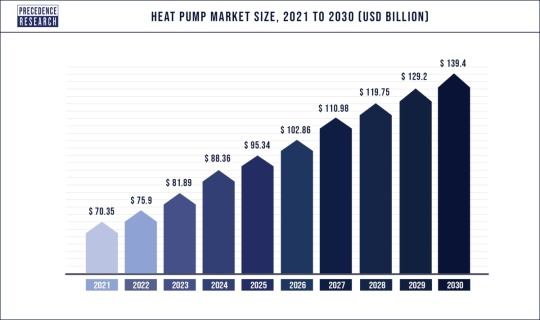#heat pump market
Text
The global Heat Pump Market is expected to grow from an estimated USD 90.1 billion in 2024 to USD 157.8 billion by 2029, at a CAGR of 11.8% during the forecast period according to a new report by MarketsandMarkets™.
#heat pump market#heat pump solutions#heat pumps#heat pump#heat pump system#heat pump repair#heat pump installation#heat pump service#heat pump maintenance#Heat Pumping#energy#energia#power generation#power#utilities#electricity#utility#renewable power#renewableenergy#energy efficiency#carbon reduction#reduce carbon emission#hvac#hvac installation#hvac services#heating#cooling system#cooling#coolingsolutions#air conditioning
0 notes
Text
Heat Pump Market Industry Development Scenario and Forecast to 2035
research analysis on “Heat pump Market: Global Demand Analysis & Opportunity Outlook 2035” delivers a detailed competitor’s analysis and a detailed overview of the global heat pump market in terms of market segmentation by application, technology, operation, and by region.
Growing Concern About the Escalating Carbon Emissions to Promote Global Market Share of Heat Pump
The global heat pump market is estimated to grow majorly on account of the growing carbon footprint worldwide with the rapidly increasing demand for energy by the global population as well as the increasing utilization of fossil fuels. It is anticipated that the consumption of fossil fuels worldwide is rising by over 1% each year. Additionally, residential buildings in the United States alone contribute to nearly 20% of U.S. carbon emissions, with 50% contributed by burning fossil fuels.
Moreover, the rising implementation of heat pump technologies is responsible for the increasing sales of heat pumps as they are becoming a prerequisite in newly built homes and as a part of home renovations. As per research, the United Kingdom announced a target of 600,000 heat pump sales annually by 2028 with plans to introduce a ban on oil and gas boilers within the next 5 years. As electrical resistance heating is anticipated to be ~61% to 131% more expensive than heat pumps, there is increased demand for heat pumps in the end user industries like paper, textile, food and beverages, chemical, metal, automotive, mechanical, wood, and many others. All these factors are anticipated to boost the market growth in the forecast period.
Some of the major growth factors and challenges that are associated with the growth of the global heat pump market are:
Growth Drivers:
Surge in Adoption of Heat Pumps in Multiple Industries
Rising Installation of Heat Pumps
Challenges:
The rising concern about global warming as well as the ban on certain fluorinated and non-fluorinated solutions such as F-gas that are currently widely used in many applications including heat pumps are some of the major factors anticipated to hamper the global market size of the heat pump. F-gases are often used as substitutes for ozone-depleting substances but are also considered a powerful greenhouse gas. By 2030, current EU regulation seeks to reduce F-gas consumption to a third of what it was in 2015. However, in an effort to counteract global warming, the EU is reconsidering this regulation and is in favor of further reducing this amount. The supply chain disruption and high cost of heat pumps are other factors that are restraining the growth of heat pump market in the forecast period.
Access our detailed report at:
By application, the global heat pump market is segmented into industrial, commercial, and residential. The industrial segment is to garner the highest revenue by the end of 2035 by growing at a significant CAGR over the forecast period. The growth of the segment can be attributed to the expanding growth of industries worldwide as well as the increased manufacturing output owing to the rising demand for goods worldwide. It was found that in 2021, the world manufacturing output increased by approximately 18.25% from 2020, reaching to ~USD 16,047 Billion.
By region, the Asia Pacific heat pump market is to generate the highest revenue by the end of 2035. This growth is anticipated by expanding industrialization in the region, especially with the growing automotive, chemical, paper, textile, and other industries. Moreover, with the increasing pool of population and their disposable income in the region, the demand for efficient space and water heating solutions in residential buildings as well as commercial spaces is surging further. It was found that in terms of passenger car production, China led the world in 2021, with nearly 21 million units of production. Moreover, as per findings, Asia accounted for a ~59% share of the global chemical industry's revenue in 2021.
Consult our expert analysts at: [email protected] or contact us at: https://www.researchnester.com/contact for any customized report.
This report also provides the existing competitive scenario of some of the key players of the global heat pump market which includes company profiling of Viessmann Climate Solutions SE, Daikin Industries, Ltd., Johnson Controls, NIBE Group, Midea Group, Ingersoll Rand Plc., Vaillant Group, Robert Bosch GmbH, The Danfoss Group, and others.
Request Report Sample@
0 notes
Text
#Heat Pump Market#Heat Pump Market size#Heat Pump Market share#Heat Pump Market trends#Heat Pump Market analysis#Heat Pump Market forecast#Heat Pump Market outlook
0 notes
Link
0 notes
Text
The global heat pump market is expected to grow from USD 53.2 billion in 2021 to USD 83.5 billion by 2026, at a CAGR of 9.5% during...
#heat pump#heat pumps#heat pump installation#heat pump repair#heat pump maintenance#heat pump market#heat pump system#heat pumping#heat pumps uk#heating#cooling#air conditioners#air conditioning#hvac systems#hvacservice#hvac maintenance#hvac#hospitality#energy efficiency#energy#energía#geothermal energy#reduce co2 emissions#reduce carbon emissions
0 notes
Text
Heat Pump Market Industry Trends and Forecast
Heat pumps are effective cooling and heating devices that work by transferring heat energy from one source to another (by reversing the natural flow of heat from a lower to a higher temperature), lowering the interior temperature. It is a low-energy replacement for furnaces and air conditioners that are used in both commercial and residential settings. The U.S. heat pumps market is registered constant growth in the recent past due to rapid installations in new homes.

The increased need for air conditioning as a result of the rise of the housing and commercial sectors, as well as government subsidies aimed at improving energy efficiency and lowering carbon emissions, has raised demand for these products. Furthermore, because of their cost-effective air conditioning, demand has surged in residential facilities.
Read more: https://bit.ly/3wXcfnG
0 notes
Text
Heat Pump Market Size is Anticipated to Reach US$ 139.4 Billion by 2030
Heat Pump Market Size is Anticipated to Reach US$ 139.4 Billion by 2030
The global heat pump market size is predicted to reach around US$ 139.4 billion by 2030, expanding at an annual CAGR of 7.9 percent, according to a 2022 study by Precedence Research, the Canada-based market Insight Company.
The demand for the heat pump is significantly growing across the residential, commercial, and industrial sectors for the applications in heating and cooling. The shifting…

View On WordPress
0 notes
Text
/PRNewswire/ -- Heat Pump Market is expected to reach USD 157.8 billion by 2029 from USD 90.1 billion in 2024 at a CAGR of 11.8% during the 2024–2029 period according to a new report by MarketsandMarkets™.
#heat pump installation#heat pump repair#heat pump service#heat pump maintenance#heat pump system#heat pump#heat pumps#heat pump market#heat pump solutions#heat pumping technology#heating#energy#energia#power#power generation#utilities#utility#renewable power#cooling system#air conditioning#air conditioner#hospitality#geothermal#geothermal technology#energy efficiency#hvac installation#hvac#hvac services#hvac systems#hvac solutions
0 notes
Text

Installed a sensor on my girl so i know when
#Funy jokey#I've become addicted to cheap zigbee switches and sensors#I set this up so the air conditioner in our bedroom will stop running when the bucket is almost full theres something wrong with me#It works too and i love it :')#Next up is a small switched pump that will pump the water out for a set amount of time#Directly to the balcony plants#Our windowsill is too high up to run the condensed water out with gravity sadly so some kind of reservoir with sensor and pump has to do#Also planning a dedicated channel for outside air directly to the compressor with some kind of blowback valve#I hate mobile acs for how they are designed but there are no good high capacity mobile acs on the market yet#This should mitigate most of the issues though#The main issue is the lack of separation of compression and expansion stages which is why you should use outside air for the former#AND i have an hourly energy price contract which means i should switch the ac on/of on a set of preset conditions#I love tinkering and this is both pretty cheap and actually rewarding us with much better sleep during heat waves & less fuss#Also electricity savings#I put a bunch of stuff on this kind of sensing/logic already and its so nice to see your expenses go down with little to no impact#I feel like such a dad even though i dont have any kids#All of this is completely local and relatively cheap to set up but you have to like tinkering a little#Hmu if you want some advice i can point you away from large cloud based nonsense & help with initial startup#The two investments are a raspberry pi and a zigbee dongle#Possibly also a p1 reader or similar if you want data directly from your utilities#And after that most investments should be 10 dollars max per sensor or switch and most of the ali ones will work#And even have fancy features like somewhat accurately displaying power usage and current#Sorry for extremely rambly long tags i just get excited sometimes
2 notes
·
View notes
Text

Working on a Fujitsu mini-split Heat pump
#www.jjjtechshvac.com#lancasterpa#hvaclife#hvactech#heat pump#pennsylvania#heating#airconditioning#repairs#furnaceinstallation#furnace repair#hvac replacement#air conditioning#air purifiers#commercial refrigeration equipment market#airconservice#boiler#boiler services#boiler installation#commercial hvac#commercial air conditioning#commercial heating systems#commercial services#chester county
2 notes
·
View notes
Text
Navigating Regulatory Frameworks in the Geothermal Heat Pumps Market

Unearthing Opportunities: The Geothermal Heat Pumps Market
Introduction
In the realm of sustainable energy solutions, geothermal heat pumps are emerging as a compelling option, leveraging the Earth's natural heat reservoirs to provide efficient heating and cooling. This article navigates through the landscape of the geothermal heat pumps market, dissecting its growth trajectory, challenges, and future prospects.
Demand Surge for Sustainable Solutions:
With a heightened global consciousness towards environmental preservation and energy efficiency, the allure of geothermal heat pumps is on the ascent. These systems tap into the Earth's stable temperatures to offer consistent indoor climate control, presenting a viable alternative to traditional HVAC setups. As regulatory bodies tighten emissions standards, the adoption of geothermal heat pumps is gaining momentum, fueled by their eco-friendly credentials and cost-effectiveness.
Technological Advancements
The evolution of technology stands as a cornerstone in enhancing the efficacy and reliability of geothermal heat pump systems. Breakthroughs like variable-speed compressors and sophisticated heat exchangers have bolstered performance while driving down operational expenses. Moreover, ongoing research endeavors aim to surmount geological challenges, paving the way for broader applications across diverse terrains and climates.
Market Catalysts and Opportunities
Numerous factors propel the growth of the geothermal heat pumps market, including:
1. Government Incentives: Fiscal incentives, tax breaks, and subsidies offered by governments worldwide incentivize the adoption of renewable energy technologies, including geothermal heat pumps.
2. Economic Savings: The substantial long-term energy savings afforded by geothermal heat pumps render them an attractive proposition for residential, commercial, and industrial consumers.
3. Environmental Imperatives: Zero-emission operation aligns geothermal heat pumps with sustainability objectives, positioning them as vital tools in mitigating climate change.
4. Heightened Awareness: Growing awareness regarding the environmental ramifications of conventional energy sources is spurring interest in greener alternatives like geothermal heat pumps.
Challenges and Roadblocks
Despite its promise, widespread adoption encounters certain impediments, such as:
1. Initial Investment: The upfront costs associated with geothermal heat pump installations often exceed those of conventional HVAC systems, deterring potential buyers.
2. Geological Limitations: The feasibility of deployment hinges on geological factors like soil composition and proximity to suitable heat sources, presenting constraints in certain regions.
3. Awareness Deficits: Limited awareness among consumers and businesses regarding the benefits of geothermal heat pumps poses a barrier to market expansion.
Future Projections
The geothermal heat pumps market is poised for exponential growth, buoyed by technological innovations, supportive policies, and escalating environmental concerns. As sustainability assumes paramount importance, geothermal heat pumps are primed to play a pivotal role in steering the energy landscape towards a greener horizon.
Conclusion
Geothermal heat pumps offer a compelling blend of sustainability, efficiency, and cost-effectiveness in the realm of indoor climate control. With conducive regulatory environments and advancing technology, the market is set to burgeon, heralding a future where geothermal energy takes center stage in the global quest for environmental stewardship.
#Geothermal Heat Pumps Market#Geothermal Heat Pumps Market Trends#Geothermal Heat Pumps Market Shares
0 notes
Link
1 note
·
View note
Text
The global heat pump market is expected to grow from USD 53.2 billion in 2021 to USD 83.5 billion by 2026, at a CAGR of 9.5% during the forecast period.
#heat pump#heat pumps#heat pump market#heat recovery steam generator#heat pump repair#heating#cooling#air conditioners#air conditioning#heat pump system#heat pump maintenance#hospitality#energy#energy efficiency#geothermal energy#geothermal
0 notes